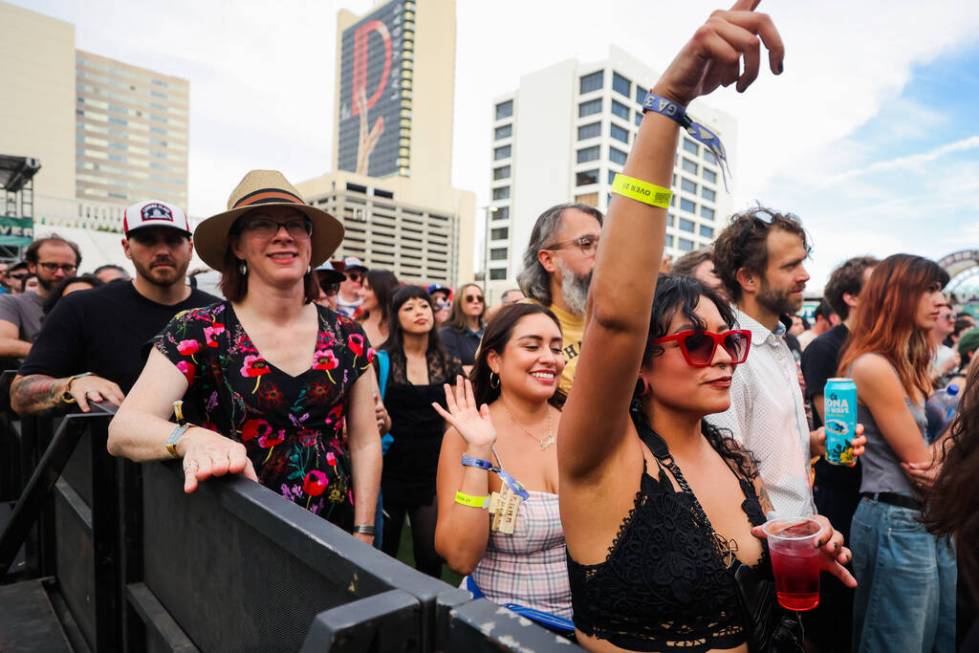Sweet emo-tion: Best Friends Forever festival debuts downtown

“I don’t know if this is like a funeral or a high school reunion.”
You could understand Mike Kinsella’s confusion, as the American Football frontman addressed the large, adoring crowd before him on Friday.
It was the opening night of the new emo and indie rock festival Best Friends Forever at the Downtown Las Vegas Events Center, and thousands strong had gathered to spend an evening getting nostalgic about sadness, to revisit the soundtrack to their tumultuous teen years, to celebrate a decidedly non-celebratory form of music.
If sad songs say so much, emo’s a real Chatty Cathy.
Best Friends Forever, which continues on Saturday and Sunday, serves as a kind of genome map for the genre, tracing the music’s DNA back to its essence.
Unlike Vegas’ other big emo gathering, When We Were Young, which returns to town this week, this fest is more focused on excavating the roots of the scene and caters to an older crowd.
“Probably a lot of people here born in ‘77,” observed Cap’N Jazz frontman Tim Kinsella, Mike’s brother, during his band’s show-closing performance.
Mainstream emo, which soared to popularity in the early aughts thanks to bands such as When We Were Young headliner Fall Out Boy, is largely predicated on big hooks and straightforward, concise songs meant to convey emotion as directly and explicitly as possible.
By contrast, the more vintage emo sounds that Best Friends Forever favors tend to be highly nuanced and involved, artful and ambitious, a musical Rubik’s Cube for listeners to solve.
It’s not as popular — none of these bands have any gold or platinum records or rock star mansions to hang them in. But what they lack in album sales they make up for in influence.
Take American Football, for instance.
Though the small-town Illinois band’s initial run lasted but three years, from 1997 to 2000, and begat one, self-titled album before the group broke up and then reunited in 2010, said record is a Midwestern emo touchstone, with literate, contemplative lyrics, deft guitar interplay and highly studious, refined song-craft. The band played the album in full on Friday, celebrating its 25th anniversary.
“Wasn’t American Football beautiful?” gushed Travis Morrison, frontman for Washington D.C’s The Dismemberment Plan, who followed them on the main stage with a frisky, free-wheeling set, Morrison wrapping his elastic voice around grand crescendos of guitar and percolating synth lines.
“Happiness is such hard work,” he sang on “Gyroscope,” a recurring theme on this night, which was all about expelling sadness cathartically in song.
“Nothing can change the pain, and I don’t want it to,” bellowed Patrick Flynn, singer for Boston post-hardcore troupe Fiddlehead, sounding a defiant note in the face of life’s difficulties during “The Years.”
In terms of intensity, Fiddlehead was rivaled by Pennsylvania’s Algernon Cadwallader, whose frontman, Peter Helmis, employed a throaty, exultant howl that sounded as if his vocal chords had been scoured by a power sander, while guitarist Colin Mahony swung his instrument like a scythe, harvesting noise and emotion in equal measure.
As the members of Algernon Cadwallader would likely acknowledge, their band would probably not exist were it not for the art-punk path blazed by Friday headliners Cap’N Jazz, who sounded like an anxiety antic feels.
The band’s songs pulsed with a nervous energy, a sustained case of the musical jitters, with slash-and-burn guitars, herky-jerky, stop-on-a-dime rhythms and everything delivered at an over-caffeinated pace.
Though Cap’N Jazz released but one album, 1995’s (take a deep breath) “Burritos, Inspiration Point, Fork Balloon Sports, Cards in the Spokes, Automatic Biographies, Kites, Kung Fu, Trophies, Banana Peels We’ve Slipped On and Egg Shells We’ve Tippy Toed Over,” it remains a hallmark of head-spinning musicianship.
As feverish as the group’s performance was, though, singer Tim Kinsella appeared a little worse for the wear and visibly intoxicated, which he attributed to having a dry throat that needed a little lubricating.
“I had to drink more whiskey than I’m used to,” he explained.
“I’m sorry this is so unprofessional,” he later apologized prior to the band’s encore. “As a godfather of emo, this is embarrassing.”
Ah well, we forgive him.
After all — to borrow a line from The Dismemberment Plan’s “Spider in the Snow,” which they performed earlier in the evening — “The only thing worse than bad memories is no memories at all.”
Contact Jason Bracelin at jbracelin@reviewjournal.com or 702-383-0476. Follow @jbracelin76 on Instagram.